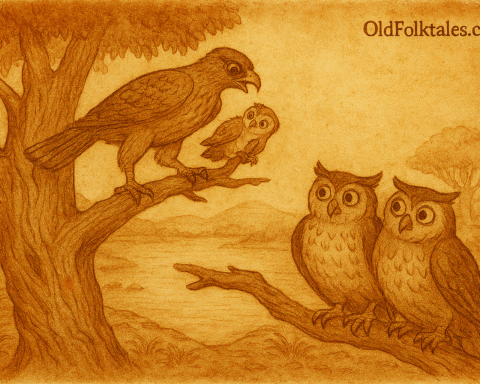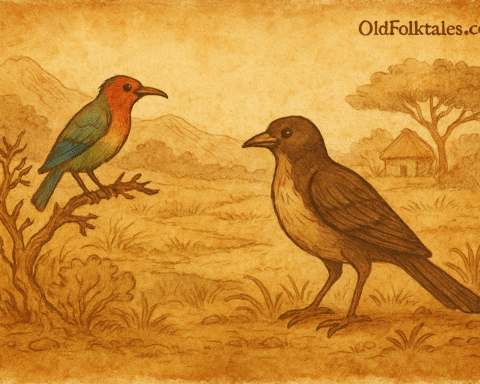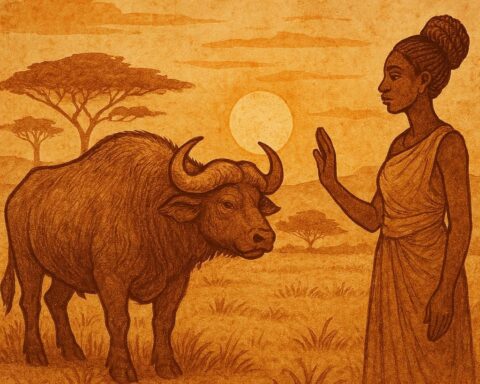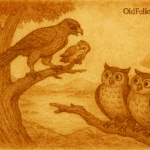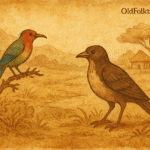Once upon a time, in a quiet Nigerian village surrounded by tall palms and red earth paths, there lived a wealthy man with a daughter renowned for her beauty. Her skin glowed like the morning sun, and her eyes sparkled as if the stars had rested in them. Young men from near and far came with gifts, seeking her hand in marriage. But this daughter was proud and stubborn. She turned away every suitor her father approved, dismissing them as not handsome enough, not charming enough, not worthy enough for her striking beauty.
Her father warned her gently, “My child, do not let pride blind you. Handsomeness fades, but kindness and character endure.” Yet she refused to listen.
One day, a stranger came to the village. He was tall, graceful, and the most handsome man anyone had ever seen. His face was smooth, his smile dazzling, and his voice like music. The daughter’s heart leapt at the sight of him. Ignoring her father’s counsel, she declared that she would marry this stranger, for surely no one else could be as perfect a match for her beauty.
Her father sighed, but the daughter’s mind was set. Preparations were made, and soon she left the safety of her father’s house to follow her new husband to his home in a distant land.
The Journey with the Skull
As they walked along the winding paths, something strange began to happen. The handsome stranger removed one of his fine eyes and handed it to a tree by the roadside. Then he took off his other eye and gave it to a riverbank. Step by step, he continued shedding his beauty, his nose, his ears, his arms, his legs, until finally, all that remained of the once-handsome man was a bare, grinning skull.
The daughter was horrified. The truth struck her like thunder: she had married not a man, but a skull spirit who had borrowed body parts to appear handsome. Now stripped of his disguise, he was nothing but bones and a hollow face.
She tried to turn back, but it was too late. The Skull seized her hand and dragged her deep into the spirit world, where shadows moved and eerie whispers filled the air. His family, a terrifying clan of skulls and spirits, welcomed her with clattering laughter. They prepared food for her, but it was foul and rotten, crawling with maggots. When she tried to eat, the stench nearly choked her.
Trapped and terrified, the daughter wept. Her pride had led her into a nightmare.
The Escape
Back in her village, her father grieved. His once-beloved daughter had vanished, carried away by the stranger she chose over her family’s guidance. Yet mercy comes even to the disobedient. In some tellings, a kind spirit or a loyal servant of her father intervened, guiding her back from the land of skulls. In others, she narrowly escaped when the Skull clan slept, running breathlessly through forests until she reached home.
When she returned, humbled and trembling, her beauty no longer shone with pride. She had learned the cost of vanity and disobedience. From that day on, she listened to her father’s counsel and valued character above appearance.
And so the story of the daughter who married a skull is told in Nigeria, a warning passed down through generations.
Moral Lesson
This folktale teaches that pride and vanity can lead to ruin. Obedience to wise counsel is more valuable than the fleeting charm of appearances. True worth lies in character, not in outward beauty, for beauty without goodness may hide only emptiness, or worse, danger.
Knowledge Check
1. Why did the daughter reject the suitors her father chose for her?
She believed they were not handsome enough to match her beauty.
2. Who did the daughter eventually choose to marry, and why?
She chose a stranger who appeared very handsome, ignoring her father’s advice.
3. What happened to the stranger during the journey to his home?
He removed his borrowed body parts one by one until he became nothing but a skull.
4. What does the Skull symbolize in this Nigerian folktale?
The Skull represents deception, vanity, and the danger of judging by appearances alone.
5. What is the main lesson of The Disobedient Daughter Married a Skull?
That vanity and disobedience can lead to disaster, while wisdom and character should guide choices.
6. What is the cultural origin of this folktale?
It is a traditional Nigerian folktale.
Source: Nigerian folktale

